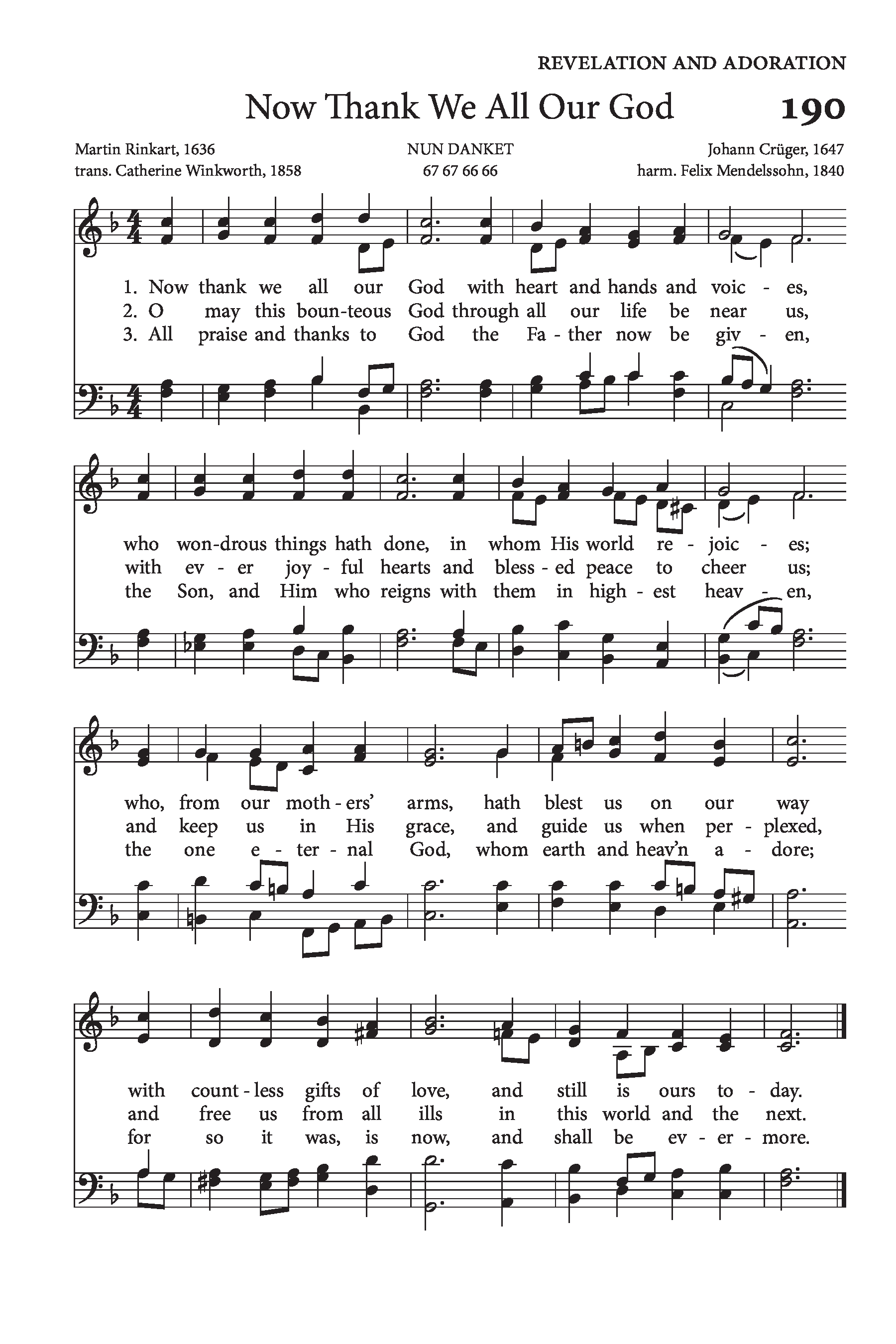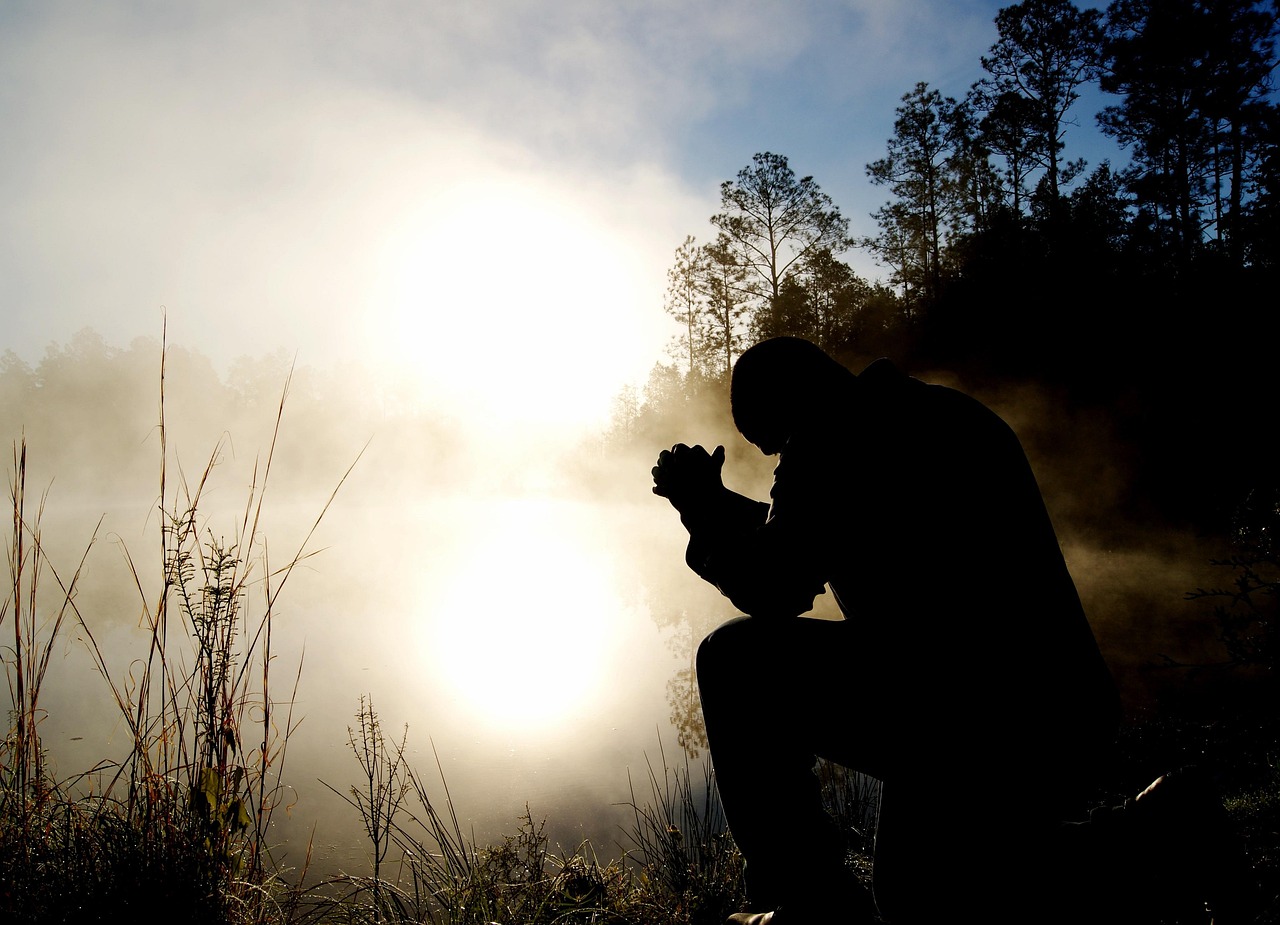Now Thank We All Our God
By Martin Rinkart
Lyrics
with heart and hands and voices,
who wondrous things has done,
in whom his world rejoices;
who from our mothers' arms
has blessed us on our way
with countless gifts of love,
and still is ours today.
through all our life be near us,
with ever joyful hearts
and blessed peace to cheer us,
to keep us in his grace,
and guide us when perplexed,
and free us from all ills
of this world in the next.
the Father now be given,
the Son and Spirit blest,
who reign in highest heaven
the one eternal God,
whom heaven and earth adore;
for thus it was, is now,
and shall be evermore.
Bible Reference
Psalm 147
About This Hymn
Author: Martin Rinkart (1586–1649)
English Translator: Catherine Winkworth (1827–1878)
Composer: Johann Crüger (1598–1662)
Tune Name: Nun Danket
Meter: 6.7.6.6.6.6
Scripture Reference: Psalm 147; Romans 8:35, 37
Who shall separate us from the love of Christ? Shall tribulation, or distress, or persecution, or famine, or nakedness, or peril, or sword? Nay, in all these things we are more than conquerors through Him that loved us. — Romans 8:35, 37 (KJV)
The hymn “Now Thank We All Our God” stands as a stirring expression of gratitude and faith—an enduring legacy of hope forged in the crucible of one of history’s darkest periods. Composed during the turmoil of the Thirty Years’ War (1618–1648), it is remarkable not only for its rich theological depth but also for the extraordinary circumstances under which it was written. Despite the widespread suffering and despair of the era, this hymn has become known as Germany’s national Te Deum, sung on countless occasions of public thanksgiving and national significance.
Martin Rinkart was born on April 23, 1586, in Eilenburg, Saxony, Germany, the son of a poor coppersmith. As a youth, he was a choirboy at Leipzig’s renowned St. Thomas Church, later famously led by Johann Sebastian Bach. Rinkart pursued theological studies at the University of Leipzig and entered the Lutheran ministry. At age thirty-one, he returned to his native Eilenburg as pastor—just as the ravages of war began to engulf the region. Because Eilenburg was a walled city, it became overcrowded with refugees fleeing military conflict, making it a prime target for disease and famine. Over the years, waves of pestilence swept through the town, and armies repeatedly occupied the city, bringing devastation in their wake. During the plague of 1637, Rinkart was the only surviving pastor in Eilenburg and often conducted 40 to 50 funerals each day. Yet through this heart-wrenching experience, he continued to minister with compassion, opening his home to those in need—even while struggling to care for his own family.
In the final years of the war, Eilenburg faced occupation by the Austrian and Swedish armies. During one Swedish occupation, an unreasonable tribute was demanded from the already destitute citizens. Rinkart, acting as the spiritual and civic leader of his community, pleaded with the Swedish commander to reduce the tribute. When his appeals were initially denied, he turned to his congregation and said, “Come, my children, we can find no mercy with man; let us take refuge with God.” Leading them in prayer and song, Rinkart’s spiritual fervor so moved the commander that the demand was significantly lowered. These acts of courage and devotion solidified Rinkart’s legacy as both a pastor and a patriot. In addition to his pastoral duties, he authored 66 hymns and several dramatic works related to the Protestant Reformation, despite the immense personal hardship he endured.
“Now Thank We All Our God” became his most enduring hymn. Its popularity grew beyond Germany’s borders, thanks in large part to the excellent English translation by Catherine Winkworth, published in 1858. Winkworth, a noted scholar and linguist, was instrumental in bringing the richness of German hymnody into the English-speaking world. She is also remembered for translating other beloved hymns such as “Praise Ye the Lord, the Almighty.” Her work helped embed these hymns into the fabric of English-language worship, where they continue to inspire congregations today.
The majestic tune for Rinkart’s hymn was composed by Johann Crüger, one of the most significant church musicians in 17th-century Germany. Crüger’s hymnal, Praxis Pietatis Melica, published in 1644, was the most influential German hymnal of its time, undergoing at least 44 editions between 1644 and 1731. The pairing of Crüger’s dignified melody with Rinkart’s grateful text first appeared in the 1647 edition and has remained a fixture in Christian worship ever since.
The hymn consists of three stanzas. The first is a broad expression of thanksgiving for God’s abundant blessings—“with countless gifts of love.” The second stanza offers a heartfelt prayer for divine guidance and protection, possibly echoing Rinkart’s own personal trials with the plea, “Guide us when perplexed and free us from all ills.” The final stanza is a glorious doxology that exalts the triune God—the Father, Son, and Holy Spirit—as the “one eternal God.” Despite being written in an age of suffering, this hymn has become a universal song of hope, offering praise not only for the blessings of peace but also for the sustaining grace found in the midst of suffering.


📬 Subscribe to Our Devotional Updates
Receive weekly hymns, devotionals, and website features directly in your inbox.
Hymn Information

- Category: Hymn
- Author/Writer: Martin Rinkart (1636)
- Added: July 2, 2025
- Last Updated: July 2, 2025
- Views: 1579
MIDI File
Recent Blog Posts
-
 How to Develop a Consistent Prayer Schedule
How to Develop a Consistent Prayer Schedule
Dec 11, 2025 -
 How to Forgive Someone Who Deeply Hurt You
How to Forgive Someone Who Deeply Hurt You
Dec 11, 2025 -

-
 Why Christmas Is Celebrated on December 25
Why Christmas Is Celebrated on December 25
Dec 11, 2025 -
 10 Most Renowned Hymn Writers
10 Most Renowned Hymn Writers
Dec 10, 2025
Visit Us on Social Media
Latest from X (Twitter)
Tweets by HymnalLibraryLatest from Facebook
Latest on YouTube
Daily Bible Verse
Disclaimer
The hymns, sheet music, MIDI files, and related content on this website are provided for educational and research purposes only.
- Public Domain: Many of the hymns featured here are in the public domain and may be freely used.
- Copyrighted Works: Some hymns may still be under copyright protection. Where applicable, permission has either been requested from the copyright owner, or the content is shared under the principles of fair use for educational purposes.
⚠️ Important Notice: If you wish to reproduce, distribute, or use any copyrighted hymn beyond personal study or educational use, you must obtain permission directly from the copyright holder. This website does not grant any rights for commercial use yet.
If there is any other question please address it to us in our Contact Page, for further assistance. Thank you for using the site. May God Bless You.